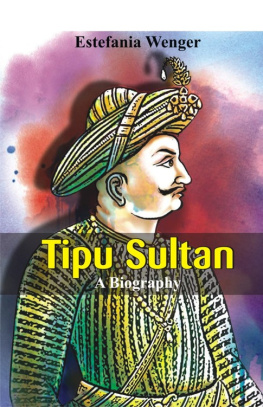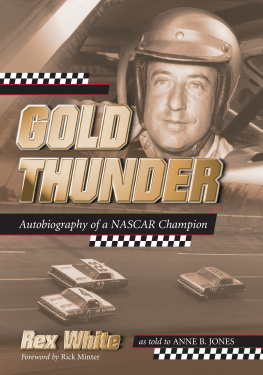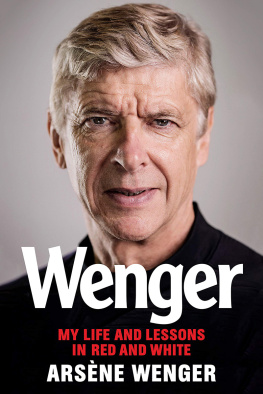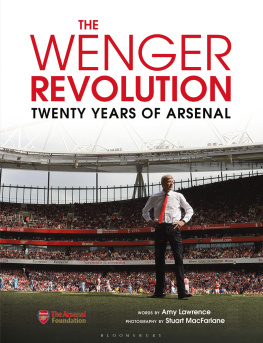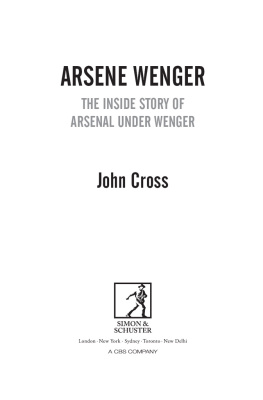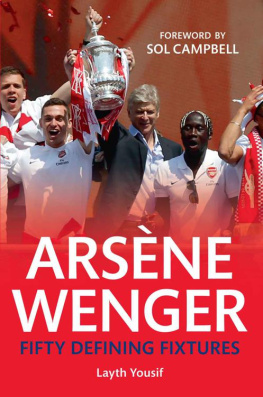Wenger - My Life in Red and White: My Autobiography
Here you can read online Wenger - My Life in Red and White: My Autobiography full text of the book (entire story) in english for free. Download pdf and epub, get meaning, cover and reviews about this ebook. year: 2020, publisher: Orion, genre: Home and family. Description of the work, (preface) as well as reviews are available. Best literature library LitArk.com created for fans of good reading and offers a wide selection of genres:
Romance novel
Science fiction
Adventure
Detective
Science
History
Home and family
Prose
Art
Politics
Computer
Non-fiction
Religion
Business
Children
Humor
Choose a favorite category and find really read worthwhile books. Enjoy immersion in the world of imagination, feel the emotions of the characters or learn something new for yourself, make an fascinating discovery.

- Book:My Life in Red and White: My Autobiography
- Author:
- Publisher:Orion
- Genre:
- Year:2020
- Rating:4 / 5
- Favourites:Add to favourites
- Your mark:
- 80
- 1
- 2
- 3
- 4
- 5
My Life in Red and White: My Autobiography: summary, description and annotation
We offer to read an annotation, description, summary or preface (depends on what the author of the book "My Life in Red and White: My Autobiography" wrote himself). If you haven't found the necessary information about the book — write in the comments, we will try to find it.
Wenger: author's other books
Who wrote My Life in Red and White: My Autobiography? Find out the surname, the name of the author of the book and a list of all author's works by series.
My Life in Red and White: My Autobiography — read online for free the complete book (whole text) full work
Below is the text of the book, divided by pages. System saving the place of the last page read, allows you to conveniently read the book "My Life in Red and White: My Autobiography" online for free, without having to search again every time where you left off. Put a bookmark, and you can go to the page where you finished reading at any time.
Font size:
Interval:
Bookmark:

all things excellent are as difficult as they are rare
Ethics , Spinoza
to try to make men aware of the greatness they do not know they have in themselves
The Temptation of the West , Andr Malraux
I left Arsenal on 13 May 2018.
The club had been my whole life for twenty-two years. It was my passion, my constant preoccupation. Thanks to Arsenal, I was able to pursue my managerial career in exactly the way I wanted: I was able to influence players lives, to instil a playing style in the club, and to experience some truly wonderful victories. I had a freedom and a power that managers no longer have today.
Leaving the club after all those incredible, intense, unforgettable years, and losing the intensity of that power, was difficult. Arsenal is still a part of me: I say my club when Im talking about it and, even though its in other hands now, I am still as passionate as ever about the club, about the supporters, about the players who are selected, coached, supported, and pushed to give their best. What matters to me are the game and the men, those moments of grace that football offers to those who love it and who give it their all.
Matches won are precious memories, and matches lost, the ones I still dont dare watch again, continue to haunt me even many years later: what should we have done? What happened? My whole life has swung between loving victory and despising defeat.
I am passionate about football and that passion has never dimmed.
When I arrived at Arsenal, the English didnt know who I was. The question Arsne who? came up time and again. I understood. I was only the fourth foreign manager in the history of top-flight English football. The first three had had mixed fortunes. The English codified the rules of football just as the French perfected wine. We dont often ask an English person to come over to make Bordeaux. For twenty-two years, I tried to make the truth of the game and the pitch prevail. I had already known defeat, disappointments, huge anger, departures, and fantastic players, but no team had become part of me quite like this one.
The club changed so much, and I changed with it, and football has changed with us. My kind of football, the conditions in which I pursued my passion, the freedom I had, my longevity as the manager of a club, these things have all but disappeared. I am not sure a player today who still didnt have a club at fourteen, or a coach until he was nineteen, could go from the French departmental championships to Ligue 1 and play so many matches and have so many adventures. And nor am I sure that a manager nowadays could have overall management responsibility for a team like Arsenal and choose his players in the way I did, with total freedom and total involvement. I was fortunate, but I know what sacrifices I made, too.
In recent years, football has undergone many profound transformations. Some of the changes, I think, are more striking than others: the increasing number of foreign owners; the emergence of social media with its demands and excesses; the unremitting pressure on and isolation of players and managers, at a time when expectations have never been higher. Football has changed a great deal both pre- and post-match, notably with more analysis of the game. But one thing does not change: the 90 minutes still belong to the player, 90 minutes during which he is king.
European football is no longer dominated by three clubs, as it once was. The other teams have moved up to their level.
Analysts have taken on a very prominent role and are involved in matches right from half-time, making it possible to understand the game better, and to have objective criteria for analysing the match, whereas previously everything had been left to the subjectivity of the manager. Nevertheless, the manager remains the sole decision maker.
Statistics and science must be a part of performance analysis, but they need to be used in combination with a deep knowledge of the game. The latest studies show that players are demoralised by too great a use of statistics, no doubt because they feel their individuality is lost in the process.
More than ever, a manager is responsible for a teams results even though he does not always have the means to influence every decision. Comments about him are always exaggerated one way or the other: Hes brilliant, or Hes rubbish.
We are often involved in these transformations without really being aware that they are happening, and we remain focused on what we believe. But today I have emerged from my bubble and everything seems clearer to me: the unjustified attacks, the exaggerations, the loneliness of the manager. I read Lquipe every day, I watch two, sometimes three matches a day, I listen and wonder how whats being said can be fair, why certain things happen as they do, where the truth of the game lies, and I do the same with my life, my commitments, my passion.
I look at all these changes and I think about them, and yet I always see football for what it is and what it should be: a match where anything can happen, the players, 90 minutes, fantastic moves, an element of luck, talent, courage, a touch of magic and, for those who are watching these men play, the search for excitement, for a memory, for a lesson in life.
Football exists under the pressure to perform. You need to know how to take a step back, to analyse things from above. A club depends on three things in order to grow: strategy, planning and application.
I have been playing since I was a child. Ive known amateur clubs with players and coaches who played wonderful football, who were excited about every match, who talked about nothing but football, who were capable of crossing France on a second-class sleeper train to play a match then travelling back to Strasbourg in the early hours of the morning to go straight in to work at a factory, without complaining, without any expectations other than playing and winning the next match. That creates lifelong bonds, and the coaches from those teams have been my mentors. They were passionate, and realistic, too, and they knew how to communicate their love of the game.
Playing is still a source of joy for me today. Like all those who play football at any level, I continue to rediscover the excitement I felt as a child.
A day without a football match seems empty to me. I still enjoy watching football because I want to carry on learning, thinking, trying to progress in my understanding of the game and what can be offered to a player to help him evolve. But in the past few months, I have occasionally skipped watching a match with one of my favourite teams on television, or some other match I hope will be interesting. Instead of this sacrosanct time dedicated to football, I spend an evening with my daughter or my friends. Previously, that would have been impossible. So now I have some more peaceful moments when I notice the beauty around me, be it the countryside, a city like London, or like Paris where I am spending more and more time.
For thirty-five years, I lived like a top athlete, obsessed by my passion. I didnt go to the theatre or the cinema; I neglected those around me. For thirty-five years, I didnt miss a single match, a single cup, a single championship, which meant living with an iron discipline, and I continue to live like that today: I get up at 5:30 a.m., do my exercises, train, eat and drink the way my former players did. I no longer know if this is a choice or a habit that imprisons me. But its the only way for me to live. Without it, I think I would be unhappy. If happiness is liking the life one lives, I can say I have been happy, and still am.
Font size:
Interval:
Bookmark:
Similar books «My Life in Red and White: My Autobiography»
Look at similar books to My Life in Red and White: My Autobiography. We have selected literature similar in name and meaning in the hope of providing readers with more options to find new, interesting, not yet read works.
Discussion, reviews of the book My Life in Red and White: My Autobiography and just readers' own opinions. Leave your comments, write what you think about the work, its meaning or the main characters. Specify what exactly you liked and what you didn't like, and why you think so.

